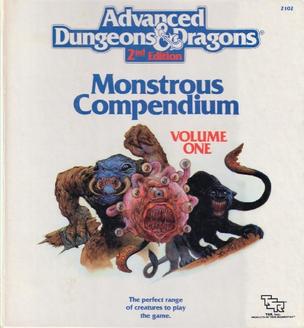
The Monstrous Compendium is a series of accessories for the Advanced Dungeons & Dragons fantasy role-playing game released from 1989 to 1998. The title was then used for a series of 5th Edition Dungeons & Dragons supplements released on D&D Beyond.
In the Dungeons & Dragons (D&D) fantasy role-playing game, alignment is a categorization of the ethical and moral perspective of player characters, non-player characters, and creatures.
The magic in Dungeons & Dragons consists of the spells and magic systems used in the settings of the role-playing game Dungeons & Dragons (D&D). D&D defined the genre of fantasy role-playing games, and remains the most popular table-top version. Many of the original concepts have become widely used in the role-playing community across many different fictional worlds, as well as across all manner of popular media including books, board games, video games, and films.
The druid is a playable character class in the Dungeons & Dragons fantasy role-playing game. Druids wield nature-themed magic. Unlike clerics, druids do not have special powers against undead and, in some editions, cannot use metal armor. Druids have a unique ability that allows them to change into various animal forms, and various other qualities that assist them in natural settings.
Hip, like cool, does not refer to a quality. What is considered hip is continuously changing. Being hip is also about being informed about the latest ideas, styles, and developments.

Complete Divine is a supplemental rulebook for the 3.5 edition of the Dungeons & Dragons fantasy role-playing game published by Wizards of the Coast. It replaces and expands upon earlier rulebooks entitled Masters of the Wild and Defenders of the Faith, as well as being a catchall for anything that does not fit into Complete Adventurer, Complete Arcane, Complete Warrior, or Complete Psionic.
The bard is a standard playable character class in many editions of the Dungeons & Dragons fantasy role-playing game. The bard class is versatile, capable of combat and of magic. Bards use their artistic talents to induce magical effects. The class is loosely based on the special magic that music holds in stories such as the Pied Piper of Hamelin, and in earlier versions was much more akin to being a Celtic Fili or a Norse Skald, although these elements have largely been removed in later editions. Listed inspirations for bards include Taliesin, Homer, Will Scarlet and Alan-a-Dale.
The Ranger is one of the standard playable character classes in most editions of the Dungeons & Dragons fantasy role-playing game. Rangers are skilled bushcraftsmen/woodcraftsmen, and often lived reclusive lives as hermits.

n+1 is a New York–based American literary magazine that publishes social criticism, political commentary, essays, art, poetry, book reviews, and short fiction. It is published three times each year, and content is published on its website several times each week. Each print issue averages around 200 pages in length.

Complete Mage is a supplemental rule book for the 3.5 edition of the Dungeons & Dragons role-playing game. It is effectively the sequel to Complete Arcane.
The Daily Beast is an American news website focused on politics, media, and pop culture. It was founded in 2008.

The 21st-century hipster is a subculture. Fashion is one of the major markers of hipster identity. Members of the subculture typically do not self-identify as hipsters, and the word hipster is often used as a pejorative for someone who is pretentious or overly concerned with appearing trendy.

Eating Animals is the third book by the American novelist Jonathan Safran Foer, published in 2009. A New York Times best-seller, Eating Animals provides a dense discussion of what it means to eat animals in an industrialized world. It was written in close collaboration with Farm Forward, a US nonprofit organization promoting veganism and sustainable agriculture.

Denizen is a 2010 low-budget sci-fi horror-action film written and directed by J.A. Steel. The film stars Steel, Julie Corgill, Glen Jensen, Ben Bayless, and Jody Mullins, and is Steel's third feature film.
Robert Lanham is the author of the satiric books The Hipster Handbook, Food Court Druids, Cherohonkees, and Other Creatures Unique to the Republic, and The Sinner's Guide to the Evangelical Right. He coined the term idiosyncrology, the study of idiosyncratic people, and his books often parody the eccentric people one finds in the United States. Neal Pollack calls Lanham "the Margaret Mead of the North American weirdo." In an article published in the fall of 2009, referred to Lanham as one of "Five Voices That Matter in the Music Blogosphere."
John Michael Greer is an American author and druid who writes on ecology, politics, appropriate technology, oil depletion and the occult.

Hotel Valhalla: Guide to the Norse Worlds is a collection of short stories about Norse mythology. The book is a supplementary work in the Magnus Chase and the Gods of Asgard series, written by Rick Riordan. It was released on August 16, 2016 and was published in United States by Disney Hyperion, in United Kingdom by Puffin Books and was also translated into five languages to date.
Ixalan is a Magic: The Gathering expansion block consisting of the sets Ixalan and Rivals of Ixalan. The first set of the block was released on September 29, 2017 and Rivals of Ixalan was released on January 19, 2018.

Throne of Eldraine is a Magic: The Gathering expansion set. It is not part of a block. It was released on October 4, 2019. The sets development codename is "Archery", and its expansion code is ELD. MTG Arena also officially launched with this set.
Ikoria: Lair of Behemoths is a Magic: The Gathering expansion set. It is not part of block. The sets development codename is "Cricket", and its expansion code is IKO. The set was released on April 17, 2020 in Asia and on May 15, 2020 in the rest of the world. The release date of the set was delayed due to the COVID-19 pandemic.









